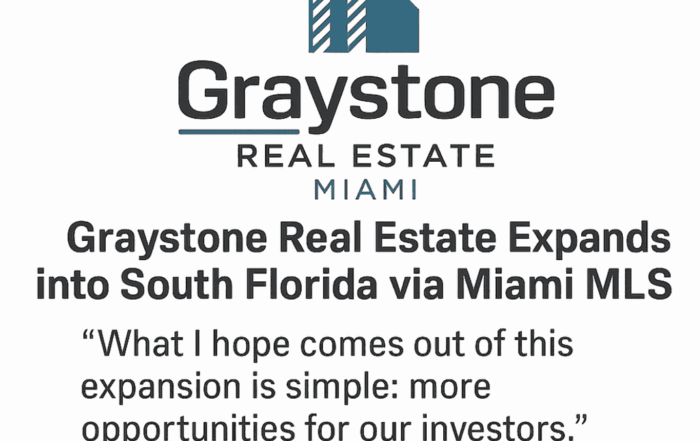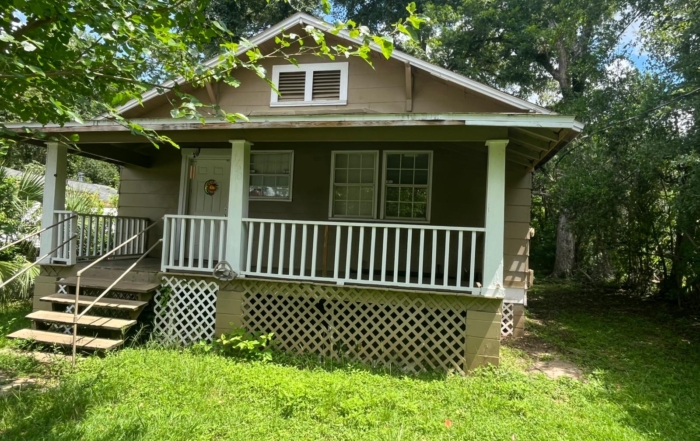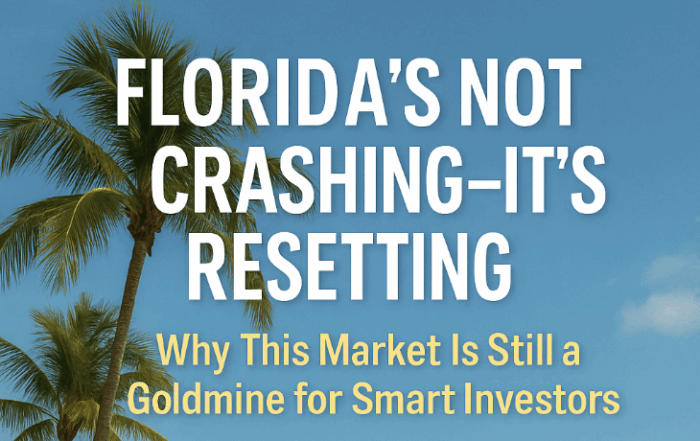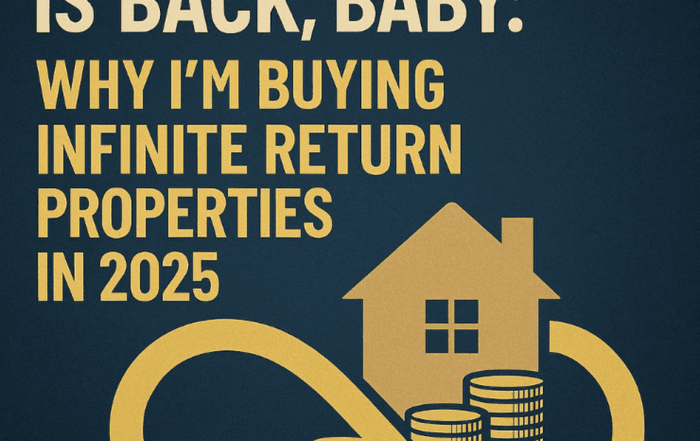
Taxes Flattening and Going Down in Florida: Good News for Cash Flow Investors
After managing properties for over 20 years and completing more than 3,500 real estate transactions, I’ve seen firsthand how trends like property taxes can make or break an investment portfolio. Recently, as I reviewed the property taxes on my 30 rental properties, something stood out—most of my properties had steady taxes, while some even dropped by as much as 5%.

Here are some examples of a property’s tax schedules.
This is fantastic news if you’re an investor focused on cash flow. Why? Because it gives you more predictability and profit in a market that’s already one of the best for landlords. Let’s dive deeper into why flattening or declining property taxes matter for investors, what’s driving this trend, and how you can use this information to grow your portfolio.
The Power of Lower Taxes for Real Estate Investors
For real estate investors, taxes play a huge role in determining cash flow. When you buy a property, you’re not just paying for the mortgage, insurance, and maintenance—you’re also responsible for property taxes. In high-tax states, taxes can be so high that they eat into your profit margins. Florida, however, is different.
Here’s why lower or steady taxes are great news:
- Boosts Cash Flow: The less you spend on taxes, the more money you keep in your pocket each month. For landlords like me managing 30 properties, even a $100 drop in taxes per property can translate to $3,000 annually—money that can be reinvested or saved.
- Predictability: Taxes that stay stable (or even decline) make it easier to budget and plan for the future. Investors love predictability because it reduces risk.
- Improves ROI: When your expenses go down but your rental income stays the same (or increases), your return on investment (ROI) improves. This makes your investment more profitable over the long term.
The Trend: Why Are Florida Property Taxes Flattening or Declining?
So, why are taxes holding steady or even going down in Florida when property values have been climbing? A few factors are at play:
1. Florida’s Save Our Homes Act
The Save Our Homes (SOH) Act caps the annual increase in property tax assessments for primary residences (homesteads) at 3% or the rate of inflation, whichever is lower. While this directly applies to owner-occupied homes, it indirectly affects investors too by keeping the overall tax environment stable. Even in non-homesteaded properties, Florida caps annual tax increases at 10%, which is still a safeguard for landlords.
2. Stable Tax Rates in Key Markets
Florida has seen explosive population growth over the past decade, but many counties and cities have opted to keep their millage rates steady to attract more residents and investors. Unlike high-tax states like California or New York, Florida’s local governments focus on making the state tax-friendly.
3. Legislation to Curb Insurance and Fraud Costs
Florida passed legislation in 2022 to tackle rampant insurance fraud, particularly related to sinkholes and hurricanes. By reducing fraudulent claims, the overall cost of owning property in Florida—including taxes and insurance—has stabilized. This has been a huge win for landlords, especially those like me who invest in affordable, high-demand areas.
4. Gentrification in Low-End Markets
Many of my properties are in what I call the “higher end of the low-end” market. These are neighborhoods that are improving due to gentrification and economic development. In these areas, property values are rising, but taxes haven’t caught up yet, creating a sweet spot for investors.
Case Study: My 30 Rentals
Let’s put some real numbers on this. After analyzing my property taxes, I noticed some interesting trends:
- $300+ Drop on a Single Property: One of my properties saw a $300 reduction in property taxes over the past year. This might not seem like much, but across a portfolio of 30 properties, that adds up quickly.
- Steady Rates Despite Rising Values: Many of my properties increased in market value, but the taxes stayed the same due to Florida’s tax caps.
This consistency is one of the main reasons I continue to invest in Florida. It’s not just about appreciation—it’s about cash flow. When you’re running a business, you need stability, and Florida delivers that.
Why the “Higher End of the Low-End Market” Works
Now, let’s talk about strategy. Over the years, I’ve focused on buying properties in the higher end of the low-end market. What does this mean?
- Affordable for Renters: These properties are priced in a range that’s affordable for most tenants, meaning they stay rented even in tough economic times.
- Stable for Owners: They’re in neighborhoods that aren’t the cheapest, but they’re also not the most expensive. This sweet spot creates stability.
By focusing on this type of property, I’ve been able to create a portfolio that generates consistent cash flow, even during market downturns. And with taxes staying flat or dropping, the benefits keep stacking up.
Why Florida Is a Haven for Cash Flow Investors
If you’re new to investing or considering expanding your portfolio, Florida should be on your radar. Here’s why:
1. No State Income Tax
Florida is one of the few states with no income tax. This is a huge draw for both residents and investors, as it keeps more money in your pocket.
2. Landlord-Friendly Laws
Florida’s laws favor landlords, making it easier to manage tenants and evict non-paying renters if necessary. This creates a more predictable investing environment.
3. High Demand for Rentals
With a growing population and strong job market, Florida has a high demand for rental properties. This ensures that your units stay occupied, providing steady cash flow.
Key Lessons for New Investors
If you’re just starting out in real estate investing, here are some tips to help you take advantage of Florida’s favorable tax trends:
-
Research Tax Histories
Before buying a property, review its tax history. Look for properties with stable or declining taxes, as this can indicate a lower risk of unexpected expenses. -
Invest in Gentrifying Areas
Target neighborhoods that are improving but haven’t fully matured yet. These areas often have lower taxes but strong potential for appreciation. -
Focus on Cash Flow
Don’t get distracted by properties with high appreciation potential but negative cash flow. Remember, cash flow is king when it comes to building a sustainable portfolio. -
Work with Local Experts
If you’re investing (out of state), work with a local property manager or agent who understands the market. They can help you navigate tax and legal requirements.
What’s Next for Florida Real Estate?
As an investor with decades of experience, I’m optimistic about Florida’s real estate market. Here’s what I see happening over the next few years:
- Continued Demand: Florida will remain a top destination for renters and investors, driving up demand for rental properties.
- Stable Taxes: Thanks to legislation like the Save Our Homes Act and efforts to curb fraud, property taxes are likely to remain stable.
- Opportunities in Gentrifying Areas: Investors who focus on the higher end of the low-end market will continue to see strong returns.
Final Thoughts
Florida is a goldmine for real estate investors, and the recent trend of flattening or declining property taxes only makes it better. By focusing on cash flow and targeting stable markets, you can build a resilient portfolio that performs well in any market condition.
If you’re ready to take your investing to the next level, join me at Property Profit Academy. Let me show you how to create a portfolio that generates consistent cash flow and builds long-term wealth.
Keep it consistent, stay patient, stay true—if I did it, so can you! Ready to learn? Let me guide you at propertyprofitacademy.com. – Jorge Vazquez, CEO of Graystone Investment Group & its subsidiary companies and Coach at Property Profit Academy
OUR BEST ARTICLES
The Power of Home Equity: Utilizing Your Property’s Value
allanmcnabb2025-07-01T20:40:35+00:00July 1st, 2025|Comments Off on The Power of Home Equity: Utilizing Your Property’s Value
Your home is more than just a place to live; it’s one of the most significant financial [...]
Graystone Real Estate Expands into South Florida via Miami MLS
Jorge Vazquez2025-07-01T00:47:05+00:00July 1st, 2025|Comments Off on Graystone Real Estate Expands into South Florida via Miami MLS
Graystone Real Estate Expands into South Florida via Miami MLS FOR IMMEDIATE RELEASE June 30, 2025 TAMPA, FL — [...]
For Sale: 1046 Dover St, Tallahassee, FL 32304
Jorge Vazquez2025-06-30T18:14:58+00:00June 30th, 2025|Comments Off on For Sale: 1046 Dover St, Tallahassee, FL 32304
Property Details: • Address: 1046 Dover St, Tallahassee, FL [...]
Protected: Here’s How to Get Assignment Fees Financed (Even When Lenders Push Back)
Jorge Vazquez2025-07-01T20:45:37+00:00June 30th, 2025|Comments Off on Protected: Here’s How to Get Assignment Fees Financed (Even When Lenders Push Back)
This content is password protected. To view it please enter your password below: Password:
Florida’s Not Crashing—It’s Resetting: Why This Market Is Still a Goldmine for Smart Investors
Jorge Vazquez2025-06-28T22:52:38+00:00June 28th, 2025|Comments Off on Florida’s Not Crashing—It’s Resetting: Why This Market Is Still a Goldmine for Smart Investors
The so-called "decline" in Florida’s housing market is nothing like 2008. Back then, we were dealing [...]
Subject-To Is Back, Baby: Why I’m Buying Infinite Return Properties in 2025
Jorge Vazquez2025-06-28T22:45:54+00:00June 27th, 2025|Comments Off on Subject-To Is Back, Baby: Why I’m Buying Infinite Return Properties in 2025
Subject-To Is Back, Baby: Why I'm Buying Infinite Return Properties in 2025 It’s crazy the [...]
Ready to take your real estate investing knowledge to the next level? Join our Property Profit Academy today! https://www.propertyprofitacademy.com

Meet our Team of Experts!
Meet Cody Bergstrom, Your Expert in Finding Deals
My team and I have over 20 years of experience in real estate. We have strong relationships with wholesalers, probate lawyers, sellers, and others in Florida. I aim to align your investments with your vision and deliver exceptional results. Contact Vanessa to schedule a meeting: https://graystoneig.com/cody

Meet Lisa Kaye Price, the LendingGig Top MLO
Lisa-Kaye Price – Real Estate Lending Specialist
With 20 years in real estate, Lisa-Kaye is dedicated to helping clients achieve their investment goals through strategic financing. She and her team focus on securing the best financing solutions to maximize leverage – a unique advantage of real estate investing.
Offering various options, including conventional loans, asset-backed and private money solutions, and programs for foreign nationals, Lisa’s expertise ensures clients get the support they need, whether buying new properties or refinancing.
Schedule a meeting with Lisa: https://graystoneig.com/lisa-kaye-price
Meet Marylyn Patankar, Your Property Manager Partner
Hello, I’m Marylyn Patankar, the Field Manager and New Client Ambassador at Graystone Property Management. I educate investors about our perks, onboard new landlord investors, and manage on-site operations. Schedule a meeting with me here: https://graystoneig.com/marylyn








